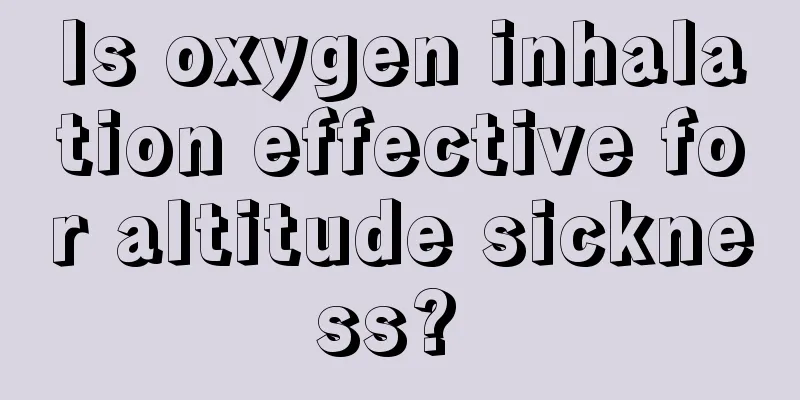Is oxygen inhalation effective for altitude sickness?

|
Plateaus are continental areas that rise above a certain range from the horizon. Plateaus account for a large proportion of my country's area. For example, the Qinghai-Tibet Plateau is a typical plateau landform with an average altitude of more than 4,000 meters. Hypoxia occurs in this area, and the health problems caused by this are also called altitude sickness. When this kind of reaction occurs, it is necessary to seek timely treatment. Let’s take a look at whether oxygen inhalation is effective for altitude sickness. The oxygen content on the plateau is lower than on ordinary ground. The higher the altitude, the more oxygen is lacking. Moreover, for people who go to high altitude for the first time, since they adapt to the oxygen concentration on ordinary ground, their hemoglobin in the body is relatively low. If they live in the plateau for a certain period of time, their blood will become rosy because of the increase in hemoglobin. In fact, altitude sickness does not require oxygen. It depends on the specific symptoms. Altitude sickness refers to a variety of pathological reactions that occur when the human body is rapidly exposed to a low-pressure, low-oxygen environment. It is a common disease unique to plateau areas. Common symptoms include headache, insomnia, loss of appetite, fatigue, and difficulty breathing. Headache is the most common symptom, often with throbbing pain in the forehead and temporal areas, which worsens at night or when getting up in the morning. Increasing lung ventilation, such as breathing through the mouth and light activity, can relieve headaches. 1. Mild symptoms No treatment is required, and the symptoms usually disappear on their own after 1 to 2 weeks of adaptation. For those with more severe reactions, symptomatic treatment with analgesics, sedatives, antiemetics, etc. may be used as appropriate. "Amiproben" and "Xionin" can also be used for headaches and vomiting. The latter mainly acts on the vomiting center and has no inhibitory effect on other areas. 2. Severely ill patients Oxygen inhalation can be given intermittently or continuously. Long-term oxygen inhalation is not recommended because it hinders the body's adaptation to the low oxygen environment. If necessary, mild diuretics such as acetazolamide or oral administration of aminophylline can be used for treatment. The basic principle of treatment is early diagnosis to avoid the development of severe altitude sickness. There is no special treatment for mild patients, and most people's symptoms will naturally ease or disappear after they fully adapt within 12 to 36 hours. |
<<: What does urine protein addition and subtraction mean
>>: There is hemoglobin in the urine
Recommend
What is the reason for slow hangover sobering
Alcohol has a great impact on the human liver, so...
What to do if your legs are not smooth and have chicken skin
Generally speaking, most people have chicken skin...
The inheritance rate of fibroids
What is the inheritance rate of fibroids? Many pe...
What's wrong with coughing and being afraid of cold?
Coughing is a stress response of the respiratory ...
What effect can the water from the root of loofah have
Luffa is a common vegetable in our daily life. It...
What are the treatments for hereditary non-polyposis colorectal cancer
What are the treatments for hereditary non-polypo...
How to end an extramarital affair
In this society, many families have some difficul...
What are the symptoms of non-gonococcal urethritis
The symptoms of non-gonococcal urethritis are dif...
What are the reasons for general fatigue and lack of energy?
People have limited physical strength, and there ...
Microwave cleaning
Microwave oven is a kind of kitchen appliance tha...
Aftereffects of lens replacement
As people age, their physical functions gradually...
Does yam reduce milk production and what is the treatment?
Many of our pregnant mothers now have no milk aft...
How should you eat if you have liver cancer? Healthy dietary principles for liver cancer patients
For people with liver problems, choosing food is ...
What is the early treatment method for laryngeal cancer
Laryngeal cancer is a highly malignant tumor. The...
How to prevent rotavirus enteritis?
Because the shape of rotavirus under an electron ...









